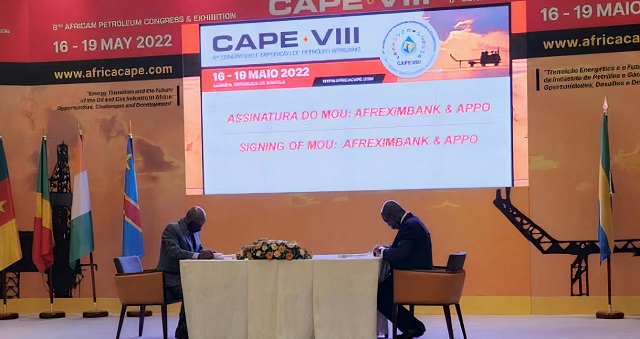
Fossil fuel lobby want bank to serve as catalyst for Africa-directed investments
Kampala, Uganda | RONALD MUSOKE | On May 16, the African Export-Import Bank (Afreximbank) signed a memorandum of understanding with the African Petroleum Producers Organization (APPO) in a move that seeks to create a multi-billion dollar energy bank on the continent.
The energy bank, according to the memorandum, will provide private sector financing for new and existing oil and gas projects as well as energy developments across the entire value chain.
The memorandum was signed by Rene Awambeng, the Director and Global Head, Client Relations, Afreximbank, and Dr. Omar Farouk, the Secretary General of APPO, in the presence of Angolan president, João Lourenço; ministers from the African petroleum producing countries and NJ Ayuk, the executive chairman of the African Energy Chamber in Luanda, Angola’s capital.
Ayuk said the proposed bank does not seek to be a substitute for private investment, but rather, will serve as a catalyst for Africa-directed investment.
“The African Energy Chamber has been pushing for the creation of an African Energy Bank, one that is African-based and Africa-focused, and I am proud to announce that the Afreximbank and APPO have taken the first steps towards its creation,” he said.
“This is a practical strategy for prosperity and a pragmatic vision that must be embraced by all who want to make energy poverty history and fight climate change.”
“Why should our pension funds go to European banks who say they will not finance Africans and call us risky? We need to use that money to finance oil and gas,” he added.
The proposal comes at the time when the global energy sector is undergoing a major investment shift, including ending investment in fuel use to stem climate change.
However, African energy experts say the global energy transition should be approached with a bit of caution and context for the African continent. They say Africa is still grappling with “the crisis of energy poverty” with over 600 million people lacking access to electricity and 900 million people lacking access to clean cooking solutions. Interestingly, global investors are shying away from hydrocarbons, leaving the continent without the investment it needs if it is to capitalize on its resources.
Early this month, President Yoweri Museveni wrote in The Telegraph, a British newspaper, defending Uganda’s Lake Albert Basin oil project which investors gave the green light in February, this year, but continues to face negative press from climate change activists.
President Museveni noted in the article that although the Western world is trying to champion the transition to renewable energy, an ambition which is laudable, “it is the way they are going about it that is misguided.”
Museveni said given the demand for oil and gas remains as high as ever, “It is clearly time for a rethink on how the transition to green energy should be approached.”
Earlier in March, Sidronius Okaasai Opolot, Uganda’s state minister for Energy re-echoed the pro-fossil fuel exploitation position saying there is need for the energy transition to be contextualized to sync with the actual reality and the needs of the African continent.
Okaasai, who spoke in Houston, Texas, during the CERAWEEK 2022 meeting, an annual gathering of global energy industry leaders, said there is need to provide an enabling and sustainable exploitation of the oil and gas resources.
“We think that Africa needs special treatment through the provision of financing, technology and capacity building aimed at sustainable exploitation of its energy resources including fossil fuels while striving to minimize emissions.”
According to the African Energy Chamber’s first quarter State of African Energy report 2022, capital expenditure in Africa declined from US$60bn in 2014 to US$22.5bn in 2020, noting that significant levels of investment especially from African financial institutions are still required.
Coincidentally, organizations such as the Afreximbank have already made notable progress to drive oil and gas project developments in Africa. At the end of 2020, Afreximbank’s total assets and guarantees stood at US$21.5bn, with shareholder funds amounting to US$3.4bn in the energy sector. Other institutions including the African Development Bank – with an active portfolio of projects upwards of US$12bn – also represent critical providers across the African energy sector.
However, more needs to be done, and if large-scale discoveries such as those made in Namibia and Ivory Coast are to be sufficiently developed, more capital needs to be made available.
The proposed African Energy Bank will operate in the same way as the APPO-created Africa Energy Investment Corporation – a developmental financial institution created to channel resources towards the development of Africa’s energy sector.
The bank will also serve as a vessel for mobilizing African-sourced finance. Rather than utilizing international banks for pension funds, the bank will serve as an investment corporation that will channel these funds into African projects, thus, ensuring high returns of investment while developing Africa’s energy sector to drive socio-economic growth through increase in energy access.
The APPO’s members include Algeria, Angola, Benin, Cameroon, Chad, Congo, DR Congo, Egypt, Equatorial Guinea, Gabon, Libya, Niger, Nigeria and South Africa.
****
 The Independent Uganda: You get the Truth we Pay the Price
The Independent Uganda: You get the Truth we Pay the Price





